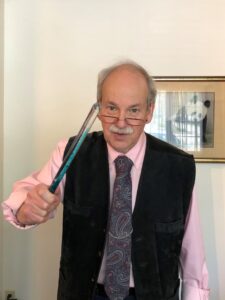by Ronan M. Kisch, Ph.D.
Editor’s Note: Dr Kisch has client consent to use their stories, and he has changed the identity of each subject so they are not identifiable.
Many of my clients are faced with returning to environments which were and are emotionally hostile and traumatizing. They are treated the way they were treated in childhood. Even thinking about these past events resurrects post traumatic stress. But clients believe they have no alternative than to return to those environments. Work, holidays, illness, deaths call for their return. The return then reinforces past emotional wounds. These events occur time after time, but their underlying dynamics are unconscious. I call these events anniversary events (Kisch, 2019). Most often just being aware of returning to these environments is sufficient to trigger anniversary reactions. How does one protect clients from this re-traumatization when just talking about it does not work?
I have clients who return to hostile environments. The individuals that they will encounter, because of intellectual limitations, emotional blocks or prejudices, are neither open to reasonable discussion nor able to be flexible in problem-solving or behavior change in how they treat these offspring. When my clients have traditionally returned to contact with these people, often relatives, they become re-traumatized by habitual behavioral patterns. I tell my clients about the anthropological approach to research to provide them with a tool to gain emotional distance from these troubling situations.
I explain that one major tool anthropologists use for their research is participant observation. Anthropologists immerse themselves into a culture and then make observations of the natives in an attempt to identify and understand their customs, rituals and behaviors. There is a continuum in the use of this tool. It ranges from standing off at a distance and just observing the natives to taking an active part in the rituals. The one stance provides factual information regarding the customs, rituals and behaviors. The other provides experiential, emotional data regarding the traditions. In either case, the anthropologist needs to maintain an objective distance to be able to understand the natives being observed.
I invite my clients to become anthropologists and take a non-judgmental distant stance to study the “natives”— their family members. But, in spite of the fact I offered this approach as a psychological tool, to help distance emotionally, de-stress and protect my clients from re-traumatization, the depth of past emotional wounding and habitual behavior has not allowed this one cognitive approach to be effective.
So, recently, I have taken a new combined approach. First, I utilize chiropractor, Scott Walkers’ (Walker, S. 1996) Neuro-Emotional Technique (NET) approach to release past wounds and provide an emotional stability from which to encounter stress. Second, I may also use the Trager® (Trager, M. 1987) somatic approach to identify emotional-physical holding patterns if they are present. Third, I walk over to my bookcase and take a glass rod with floating stars inside which I call my “magic wand.” I then walk back to my clients and tap them on each shoulder, I humorously anoint my clients by saying, “With the power vested in me by the State of Ohio, I dub you an honorary urban anthropologist.” My clients find this incredibly humorous. Their serious shrink, me, dubs them “an honorary urban anthropologist.” The significance of this event is that the humor they experience is sufficient to internalize in their memories and utilize this information to assume a strong stance of emotional distance from “the natives,” their family, in future encounters. Furthermore, it allows them to be in those situations with a prospective, cognitive-emotional distance, so that they are not re-traumatized. They develop a new independent cognitive-emotional understanding from these situations and a new sense of their own inner strength. They are able to perceive and understand psychologically who their relatives are and why. Then they are free to make an educated choice as to how they want to respond or not react to the “natives.”
Case Examples
Gail
Gail is 58 years of age. Her father was hospitalized following a stroke. He lived in another state and Gail was preparing to visit him. She did this with great trepidation not simply because she was concerned for his health and life. Gail is a gentle, sensitive woman. Gail was the child of her father’s first marriage. After he divorced and developed a relationship with a new woman he had another daughter. Gail was then diminished and treated with indifference by her father and hostility with her new step-siblings. When with them, she was the uncomfortable reminder of a former undesirable marriage and family. As she prepared to return to her former home to visit her hospitalized father, an anniversary event, she was riddled with duress. It was an extremely stressful event. She exhibited shallow breathing, shoulders braced, fingers twitching, feet and knees locked together. After performing NET, I shared the anthropological approach, participant observation, with Gail. Then I anointed her an “honorary urban anthropologist.” She thought this was particularly humorous. It immediately removed her from her anxiety and braced posture.
Upon her return from her father visit, Gail felt confident about her meeting with her father and even her hostile step-siblings. She shared this event with a relaxed countenance, not being re-traumatized. She told me that she made her visit as an urban anthropologist and her mission was to study the natives. It worked! She said, “The whole event was very successful, but I was an urban anthropologist. That approach helped me to survive the visit and not get overwhelmed with any of the family drama.” Gail now has a new tool to address family-of-origin issues.
Susan, 43 years of age, is an office manager. Unlike her rebellious older sister, Susan is a gentle, soft-spoken anxious woman. Susan’s mother in sharp contrast is harsh speaking, domineering and controlling. As a childhood survival strategy, Susan learned to be passive and submissive, not to raise her mother’s ire. This trait that she learned as a child with her mother generalized to other life situations and circumstances. While she gradually learned to be more assertive in work situations, when she returned home she would regress in her family-of-origin to her former childhood passive-submissive behavior. This was emotionally punishing for her, but she was unable to transcend it.
Susan was to return home for an uncle’s 70th birthday. Again she had trepidation over her return. As she shared this in therapeutic treatment, her breath went shallow and her feet locked together, knees braced. We performed (NET) and discussed the urban anthropological approach. Again humorously, I dubbed her “an honorary urban anthropologist.” Susan returned to the birthday event and in the forefront of her mind she was conscious of being an urban anthropologist studying the natives — her family.
Rather than acting out stereotypic passive sibling behavior with her older sister, Susan’s relationship with her sister changed. The sister has maintained her rebellious relationship with her mother. However, Susan now meets her sister on co-equal terms often more mature and stable than her older sister. Susan shares her wisdom with her older sister as to how to respond to their mother. The sister has not internalized her wisdom. As for the mother, Susan now addresses her mother with assertiveness and shares her beliefs with her mother regarding the mother’s behavior. Susan’s mother is now quieter and getting gentler in response to her daughter.
Allen, 55 years of age, came into the office distraught and expressing anger over family distress. His face was tight and pale, his shoulders up, his knees locked together, and his feet pigeon toed. When he spoke, his voice was intense and echoed his distress. Kinesiology (muscle testing) dated his physical holding back to 3 years of age. His presenting problem was his family of origin. He had two brothers and a sister. He no longer lived with them, but often visited his parents at their home. There he also had contact with his brother. Allen described the contact he had with family members as emotionally distant. The parents have had closer, warmer relationships with his siblings. Allen typically felt ignored unless someone needed something. Yet when he returned home he hoped to receive loving recognition from family members.
Allen originally came into treatment and complained of fatigue he suffered for the past 39 years. Allen, who because of his “perfectionist tendencies,” was worried about final exams at that time. He feared if he did not do well he would not be loved. He feared that he inherited his mother’s anxiety, self-criticism and fear of others’ criticism. His father was diagnosed with bipolar disorder. At eight or nine years of age, Allen had been cleaning the yard. He came in and told his father he was doing things to clean up, but his brother would not help him. To that the father painfully smacked him across the face. Allen had periodic episodes of being angry at his father.
Allen had two brothers — one biological and one adopted six months after Allen’s birth. Both suffered from suicidal ideation. Allen’s biological brother committed suicide at the age of 39. The parents were supportive of the adopted sibling, but not Allen. Allen’s adopted brother was a perpetual liar. He had an out of wedlock daughter. The father was supportive of the brother. In contrast with Allen, he said if Allen had an out of wedlock child, he “would not love him anymore.” Allen also had a sister. His sister was fired for stealing from a bank where she worked. Then she was fired from a store from which she stole $5000 of merchandise. Allen, a helper, after that incident, helped his sister write a resume to get a new job. Allen believed that all of his siblings had low self-esteem. He said that he tried to help them with their low self-esteem.
Allen did not come from a healthy family. Allen continually returned home seeking recognition, confirmation and appreciation from people who clearly were not emotionally healthy and did not possess those traits. They could not give him what they did not have.
Allen describes his parents as controlling. He says that at work he has a controlling boss like his parents. Reflecting back he says that school was an uncomfortable time for him. He felt like “a fish out of water” in high school; he did not know how to cope with adversity. “It was an assault on my nervous system.” Allen currently grieved over not being a husband and father. He sleeps poorly and wakes with a limited amount of energy.
Despite of his low self-esteem, Allen is extremely bright. He readily picked up the concept of urban anthropologist. After being anointed he took this approach back home when he visited his parents. With psychological treatment, Allen says he is “seeing his father and mother more clearly.” He was able to start to perceive who they were as individuals as a result of their psychological family histories and biology. As a result, their behaviors toward him no longer affect him. Rather than looking to his parents for confirmation he began to recognize and appreciate his own traits and accomplishments to feel proud of himself. He no longer goes to visit his parents as often. Recently after not paying rent, the brother was evicted and wanted to move in with Allen. However Allen now feels a new sense of strength, independence and choice. He chose not to let his brother do that. Allen’s nephew will soon have a birthday party. Allen, without any sense of guilt, will not go.
A year earlier Allen was braced and taut. He was riddled with anger over family stress. Now, Allen’s face is pink, soft and he radiates smiles. His shoulders are down, knees apart and no longer pigeon toed. As Allen is releasing the stress, tension and holding from his body he is starting to experience himself as he never has in his lifetime. In his releasing, he continues to become aware of and releases the habitual tension in his shoulder girdle and legs. He is happy with gentle rocking. Allen is also being an honorary urban anthropologist with his boss and work is going better. Allen, a spiritual person, had a biblical saying come into awareness that he now holds onto: “All things work together for those that love the Lord,” Romans 8:28. Recently Allen’s mother said to him, “Allen you are looking so much better.”
Allen continues to hold bracing in his legs. The bracing is related to guilt which went back to 4 years of age. He felt guilty for not being able to fend for himself. It takes longer to become aware of and release unconscious holding patterns that have been internalized for decades. However, one step at a time Allen is making progress to change his reality and experience of life. He now believes that he is open to find an accepting partner, a partner who is also a giver like himself and one who will appreciate his giving.
In the silent background of these positive changes is a somato-emotional-physical approach that allows these individuals to address life’s stresses from a firmer, more confident stance. Their personalities, postures and sense of self-identities are changing as they bring new skills to their life circumstances. Behind these changes is an ability to emotionally, intellectually and physically step back and take a new stance. This stems from a consciousness of humor, “honorary urban anthropologist,” and the cognitive-emotional-physical distance it provides from former traumatizing situations. The emotional humor contained in this orientation, an honorary urban anthropologist, creates a buffer against continuing to re-experience past traumatization or experience current traumatization. It allows for the building of a healthier personality and a more successful life.
Ronan Kisch, PhD is a clinical psychologist and bodywork educator in private practice in Dayton, Ohio. He received his doctorate degree from the University of Kentucky where he was an NIMH Trainee at the Department of Medical Behavioral Science. He received post doctoral training at the Gestalt Institute of Cleveland.
References
Kisch, R. (2019). Anniversary event. Retrieved from https://www.somatic psychologytoday.com/anniversary-event.
Trager, M., & Guadagno, C. (1987). Trager Mentastics. Barrytown: Station Hill Press.
Walker, S. (1996). Neuro emotional technique: N.E.T. basic manual. Encinitas, CA: N.E.T.
Photo Credits
woman with tear: Aliyah Jamus on Unsplash
Dr Kisch with magic wand: Dr Kisch
woman with hair in her face: Hermes Rivera on Unsplash
woman behind window: Milada Vigerova on Unsplash
man against the wall: Nijwam Swargiary
man on beach by lake: Kal Visuals on Unsplash













